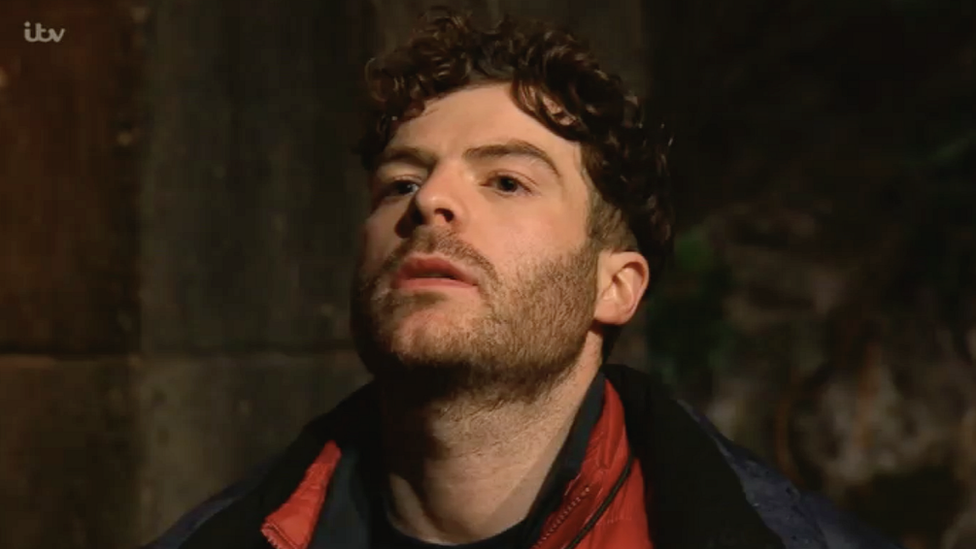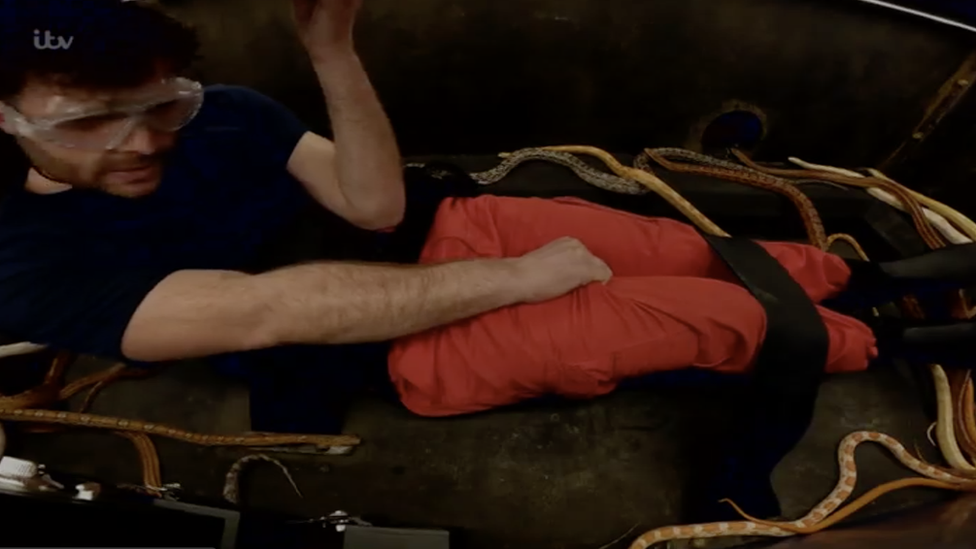I'm A Celebrity: Where do phobias come from?
- Published

He's a Radio 1 DJ... get him out of there
Turf Moor may not be most people's happy place - let's face it, it's no beach in the Maldives - but it did the trick for Jordan North on I'm A Celeb.
Faced with his two biggest fears, snakes and enclosed spaces, the Radio 1 presenter imagined himself at the home of Burnley FC to make it through the 10-minute Viper Vault challenge.
Ant and Dec described Jordan as "the most scared celebrity we have ever seen".
"I don't think I've ever been so scared in my entire life," he agreed.
But where do phobias come from and how can we take them on?

Stay calm and think of Sean Dyche
A phobia is when an irrational fear of an object, place, situation, feeling or animal impacts your day-to-day life.
Lauren Rosenberg is a fear and phobia expert, who has trained in therapies to deal with distress.
"Phobias usually are a copy behaviour from a higher authority, like a parent or teacher, or something you have learnt from your own experience," she tells Radio 1 Newsbeat.
"The subconscious mind has decided this is a danger and you need to get out of it."
She says the trauma in your mind from a past event, even from years ago when you were a child, can come back to you.
Using a visualisation or a mantra, like Jordan did with Turf Moor "can really help", according to Lauren.

According to the NHS, external common phobias include:
Animals - dogs, spiders, snakes, rodents
Environmental - heights, deep water, germs
Situational - such as visiting the dentist or flying
Bodily - blood, vomit or having injections
Sexual - such as performance anxiety

Allow X content?
This article contains content provided by X. We ask for your permission before anything is loaded, as they may be using cookies and other technologies. You may want to read X’s cookie policy, external and privacy policy, external before accepting. To view this content choose ‘accept and continue’.

What is happening to your brain?
Phobias are stronger than fears.
Clinical psychologist Warren Mansell is a fear expert from the University of Manchester.
"Our fears are hard-wired into our brains - we don't need to learn to be afraid of animals like snakes or spiders."
But he says a phobia develops when a person has experiences that make the animals seem much more dangerous - like if a sibling has taunted them with the animal when they were a child.
"An area called the amygdala in the brain is recognising a threat and preparing your body for fight or flight."
Warren says the base fear itself is positive: "To have fear of heights and water and snakes is healthy thing."
When it comes to snakes and spiders they are some of the most common phobias - experts think around 5% of people have them.
How do you take them on?
Facing phobias is the key.
"Ultimately you get over fears when you face something that you are afraid of," says Warren.
But it might not work so well when given such a big dose, like contestants get on I'm A Celebrity.
Warren says it's called "flooding your phobias", adding "it's not how a psychologist would do it, but it makes good TV".
Warren recommends breaking down phobias step by step.
So if someone has a fear of snakes they could start by looking at pictures or video of snakes.
At Manchester University, Dr Mansell and colleagues have used virtual reality to help people control the pace that they face their own fears with.
He also advises asking for help if it is impacting a person's life.
"If the person is finding that they can't do things they really want to do - I would advise them to get help. Yes."
Lauren says she likes to work with people to clear their subconscious memory and help them breathe.
"Breathing techniques are really good," she says. "Ant and Dec were telling Jordon 'breathe, breathe', protect your breath."
She adds lots of problems are personal and you need to "tune into their individual energy" in order to help.


Follow Newsbeat on Instagram, external, Facebook, external, Twitter, external and YouTube, external.
Listen to Newsbeat live at 12:45 and 17:45 weekdays - or listen back here.